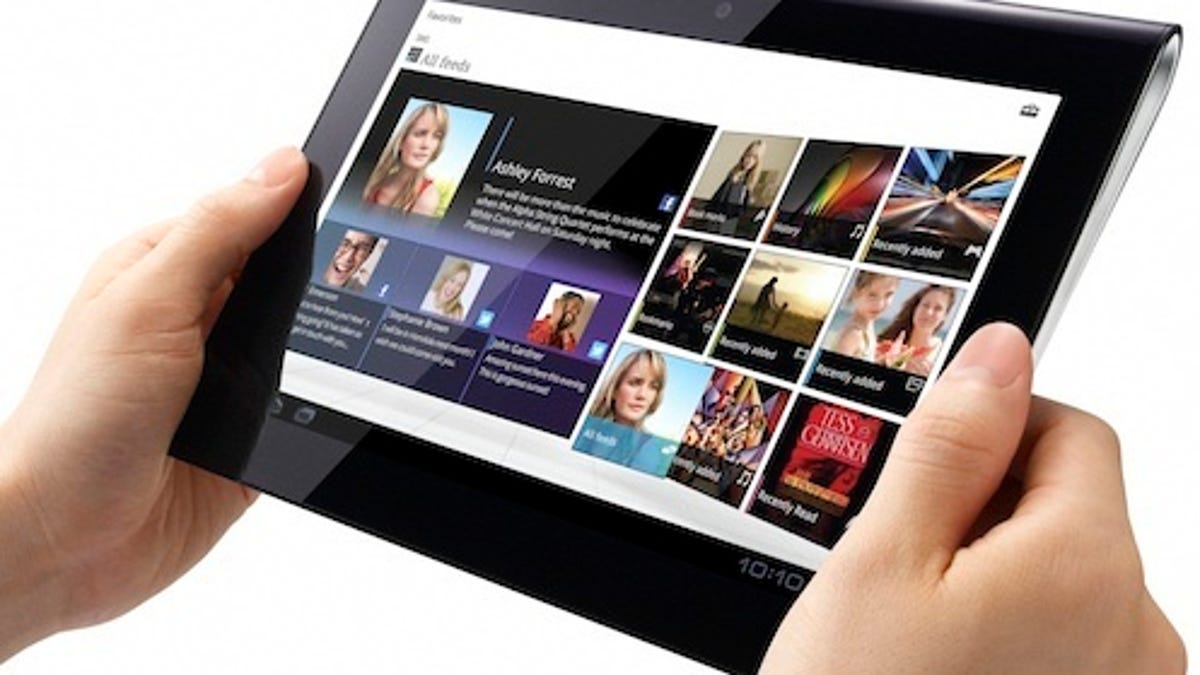Sony: We've changed, we've really changed!
Sony official disavows proprietary media formats and loves music publishing, Android, and early home-video releases.

For once, the typically secretive Sony Corp. was downright forthcoming.
While his presentation yesterday at the UBS Media Conference in New York drew far less attention than one given yesterday by Netflix CEO Reed Hastings, Robert Wiesenthal, Sony Corp of America's CFO, served up more new info about his company.
Here's a quick taste:
- Wiesenthal said Sony is no longer wedded to the idea of proprietary formats and doesn't necessarily have to try and make everything itself--which is why the company is cozying up to Google and embracing the Android operating system for some of its mobile devices.
- He again talked up the idea of releasing home video while they're still playing in theaters, which is sure to irritate theater owners.
- On the music side, he predicted the major labels will operate more like music publishers than recording companies in the future. The comments come after a Sony-led group acquired EMI Publishing.
- Wiesenthal predicted that music-subscription services will thrive once they and their costs are bundled into mobile-phone bills. He took to the opportunity to also express skepticism about Netflix's strategy to finance its own content development.
It's a testament to Netflix's influence and the way the company has captured the public's imagination that Wiesenthal, a high-ranking exec at a mammoth corporation with a movie studio (Sony Pictures), a recording company (Sony Music Entertainment), a successful videogame console and network (PlayStation) and a still-huge consumer electronics business, drew a smaller crowd than Hastings.
Be that as it may, Wiesenthal's comments covered a much bigger chunk of the entertainment sector, where his company holds far greater sway than Netflix.
Sony + Android
When asked about Sony's use of the Android operating system in such devices as the new Walkman and some of its tablets, Wiesenthal said that Sony no longer insists that it own every format the company's products operate on and is much more comfortable now using open standards.
Howard [Stringer, Sony Corp's CEO] has a done a good job of breaking down walls," Wiesenthal told the audience. "Things are moving so quickly for us. It was a big relief not to have to worry about an operating system."
Wiesenthal didn't mention that Sony managers don't have the best track record at creating their own software.
Busting windows
Over at Sony Pictures, Wiesenthal said that the studio is experimenting more with releasing movies electronically before they're available on DVD or Blu-ray. This is an idea that hasn't appeared to catch on with consumers and has been heavily criticized by theater owners. The latter group doesn't want the studios to force them to compete with the Web.
Wiesenthal says there's room to make everybody happy. Sony Pictures recently offered the movie "Bad Teacher" ahead of disc sales and Wiesenthal said that the company didn't see any sign that the Web version ate into DVD or Blu-ray sales. Why would a similar offering hurt theaters, he seemed to suggest. Wiesenthal also mentioned that film retailers and other distributors, such as Walmart, Verizon and Best Buy are also taking advantage of the Web as a means of distribution.
Walmart bought online film service Vudu last year and just yesterday Reuters reported that Verizon is planning to build a video service to challenge Netflix. Wiesenthal said he thinks theater owners will also get involved in "the digital chain." That's new. Hastings noted in his widely covered UBS presentation that he expects a host of new competitors in the future but he didn't mention theater owners.
Pirates and music bundling
On the music side, Wiesenthal made a pretty articulate pitch for making record companies operate more like music publishers. He downplayed the label's traditional "pick, pack and ship" business for the bigger margins and light overhead of publishing. He said only 17 percent of publishing revenues are associated with record sales and that means publishing is "immunized from piracy."
EMI CEO Roger Faxon should be happy to hear that since he's been pushing EMI toward becoming a rights-clearing house for years now. Can't hurt to have the new employer on the same page.
On subscription music services, Wiesenthal said he supports the strategy of bundling music into mobile phones plans. One of things he liked was the ability to tuck the costs to the consumer into a phone bill. He suggested that tying music to a mobile plan will make people less likely to dump their subscriptions and make their cellphone plans "stickier" too knowing that they could lose the music. But the CFO also seemed to acknowledge that the price has to be low enough so that subscribers don't think about it. The music costs has to be just another line item on their bill.
"This is where it's going," Wiesenthal said. "It's clearly margin and volume. It's no longer the days of 1995 CDs and the packaging 10 to 12 songs. Those days are over. The consumer has chosen and they want to pick what they want."
Since he was speaking just ahead of Hastings, Wiesenthal said Netflix was an important partner but he also displayed some doubts about Netflix's attempts to finance its own content, the way it has with the series "House of Cards."
He noted that when the Academy Awards are announced next year, Sony Pictures, Paramount and some of the other major film studios will win awards and "you won't see anyone up there from iTunes and Netflix."

